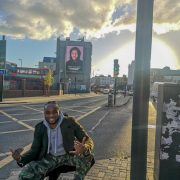#MHAM: On Imposter Syndrome and how I realised that I’m exactly where I am supposed to be


I wasn’t going to post this piece. With this originally being a university essay, the shelter of an academic institution and the very real obligation of confidentiality allowed me (without consequence) to get personal about imposter syndrome, something I did struggle with at times in the past. It also allowed me to really introspect, and necessitated my examination of certain periods of my childhood and young adulthood which I had not previously explored or looked into for deeper meaning. It is for this reason that I’ve decided to share. With Mental Health Awareness Week fast approaching, it felt right – you never know who you words could help.
“To some extent… we are all imposters” – the prophetic and triggering words of Kets de Vries; hitting home far more than they should have, a dagger of resonance cutting into my fragile ego and eliciting nothing but unsatisfactory memories and unpleasant sentimentality. Hypermasculinity and upbringing within an African household will convince you into believing that perfection is the standard to live by, and after years of hearing it, you will come to believe it. I wasn’t born a perfectionist – up until my late teenage years, raw talent and intelligence was enough to get by on. I was a ‘smart kid’. Doing ‘just enough’ was the mantra – even if never said aloud. It never really mattered, so long as I got the grades.
“To some extent… we are all imposters”
Work ethic was only really instilled within my psyche when the future that natural intelligence and intellect had opened doors to almost slipped out of my grasp and I was faced with the possibility of not seeing my dreams play out. My natural disposition changed. Almost instinctively, this brief fling I had with failure – or my own perception of it – caused a mindset switch through which perfection in the form of goal-setting almost became an obsession. My Freudian ‘ideal ego’ was born. This provided me with the fuel needed to get through my early adult years – I worked three times as hard and four times more efficiently than my peers. My combination of work ethic, boldness and confidence made me a force to be reckoned with. I did not idealise any other leader but rather idealised myself. I was on a winning streak – much like the Arsenal F.C. ‘Invincibles’, I hadn’t taken any ‘Ls’ and did not intend to start doing so. My ‘Cardi year’ lasted several years in relative terms and I saw exceptional personal growth by hitting nearly every goal that I set out to achieve. Embarking on my first full entrepreneurial journey with MIA London was a wake-up call.
My saving grace in my ‘winning streak’ years was realism; an inherent feeling or sense of self-doubt which manifested in slightly lower expectations of one’s self-worth. Rather than dwelling on this, I would set goals that I knew to be personally achievable with my immediate resources and would minimise reliance on others. I would set out to achieve a 2:1 at University; I would apply to a ‘Silver Circle’ law firm; I would do anything to keep myself out of the clasps of the vicious circle of ‘impossible’ goal-setting. During this period, I would never have applied to Cambridge University – I would not think myself capable of achieving such a goal and would not put myself in a position where I would have to find out whether this belief was true or not. I knew that I had the capabilities usually associated with ‘neurotic imposters’ – it is not a title that I wanted to claim. My ‘super-ego’ was present, but it was intentionally suppressed. Every now and again I would beat myself up momentarily before re-calibrating – something closer to ‘assault’ than to the ‘torture’ or ‘self-flagellation’ that Kets de Vries uses to describe the phenomenon. Failure and the fear of it acted as a driving force for my tapered idea of personal success. Perhaps what was really happening was that I was achieving ‘second-tier’ success; I was ‘Leicester F.C.’ winning the ‘Championship’ with a record points tally, a few years prior to winning the Premier League – an achievement nonetheless, but not quite of the same magnitude.
Entrepreneurship has encouraged me to let go of control to a certain extent. My goals have amplified, and, as a consequence, I am far more reliant on others than I ever was. In almost cyclical fashion I have had to come back to the realisation that there will be a number of times when indeed I will have to do ‘enough’ and to work efficiently and effectively to get things done – perfection may be appropriate but it will not always be. There really is no time to feel sorry for oneself and to question whether or not you belong, when you have those above, behind and around you reliant on the role that you play in goal setting and goal achieving. There really is no time to feel sorry for oneself when execution becomes of paramount importance. This is an approach that will continue with my new venture, MIA Marketplace. When one’s business model is based upon the continued existence and capitalisation of a trend, there really is no time to feel sorry for oneself, or anyone else for that matter.
More to come.
~ Aji Ayorinde // @ajibolajosiah





![ZINO VINCI’S ‘FILTHY & DISGUSTING’EP BRINGS YOU TO THE CORE OF THE ARTIST [@ZinoVinci]](https://guap.co/wp-content/uploads/2023/10/Zino-4.jpg)





![Remel London’s [@Remel_London] “Mainstream” is a must attend for upcoming presenters!](https://guap.co/wp-content/uploads/2017/02/REMEL-LONDON-FLYER-FINAL-YELLOW-COMPLETE-1.png)